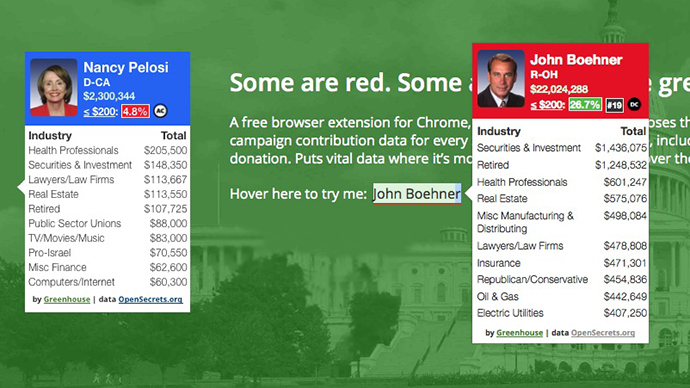Teen builds browser plugin that unmasks political money trail

Ever wonder where your congressperson’s campaign contributions come from? A new browser plugin is aiming to shed light on the money trail, and it was built by a teenager.
While there are already great tools to help informed voters look into what special interests are impacting local and national politics, such as those by the Sunlight Foundation, the new web browser tool is possibly the easiest way so far to get a glimpse into the often shady underpinnings of corporate contributions.
The plugin automatically highlights the name of any US lawmaker as you browse through the web, and a simple hover produces a popup window with a quick rundown of where that politician’s money is coming from.
The ‘Greenhouse’ plugin, available now for Chrome and Safari (and soon Firefox), displays both the percentage of campaign contributions to House and Senate members by small donors as well as those from industry. The online tool does this by pulling in data provided by OpenSecrets.org from the last full election cycle in 2012.
According to the plugin’s 16-year-old creator, Nicholas Rubin, the intent of the tool is to provide greater context to voters, regardless of their political affiliation.
“The motto of Greenhouse is: ‘Some are red. Some are blue. All are green.’ What it signifies is that the influence of money on our government isn’t a partisan issue. Whether Democrat or Republican, we should all want a political system that is independent of the influence of big money and not dependent on endless cycles of fundraising from special interests. The United States of America was founded to serve individuals, not big interests or big industries. Yet every year we seem to move farther and farther away from our Founders’ vision,” says the self-taught programmer.
Rubin’s idea highlights what is already a burgeoning offering of online resources to track money in politics. The Sunlight Foundation, for example, currently offers a number of tools that allow users to see what organizations are paying for advertisements (Follow the Unlimited Money and a related mobile app called Ad Hawk) as well as the Foreign Lobbying Influence Tracker, which, as it name implies, offers data regarding foreign governments and their influence on US policy.
There are other tools available on the web for voters interested in peering into the sources of campaign contributions at the local and federal level, including MapLight. That website offers voters the ability to simply enter their home address and receive information regarding upcoming ballot initiatives, for example.












